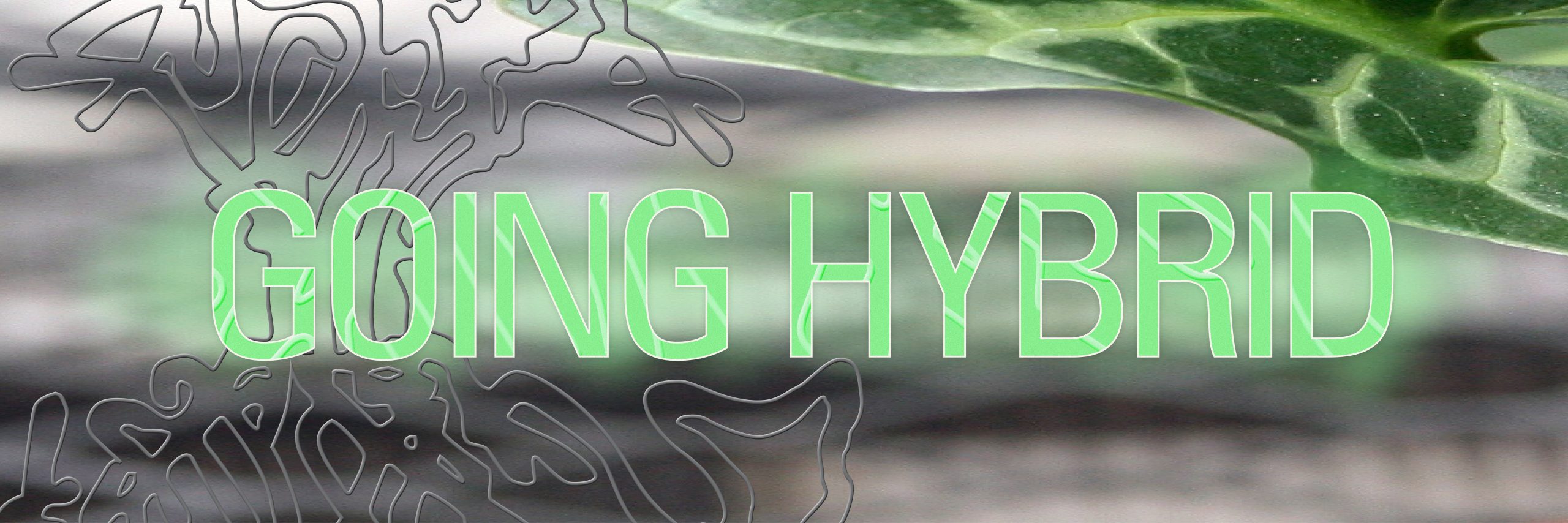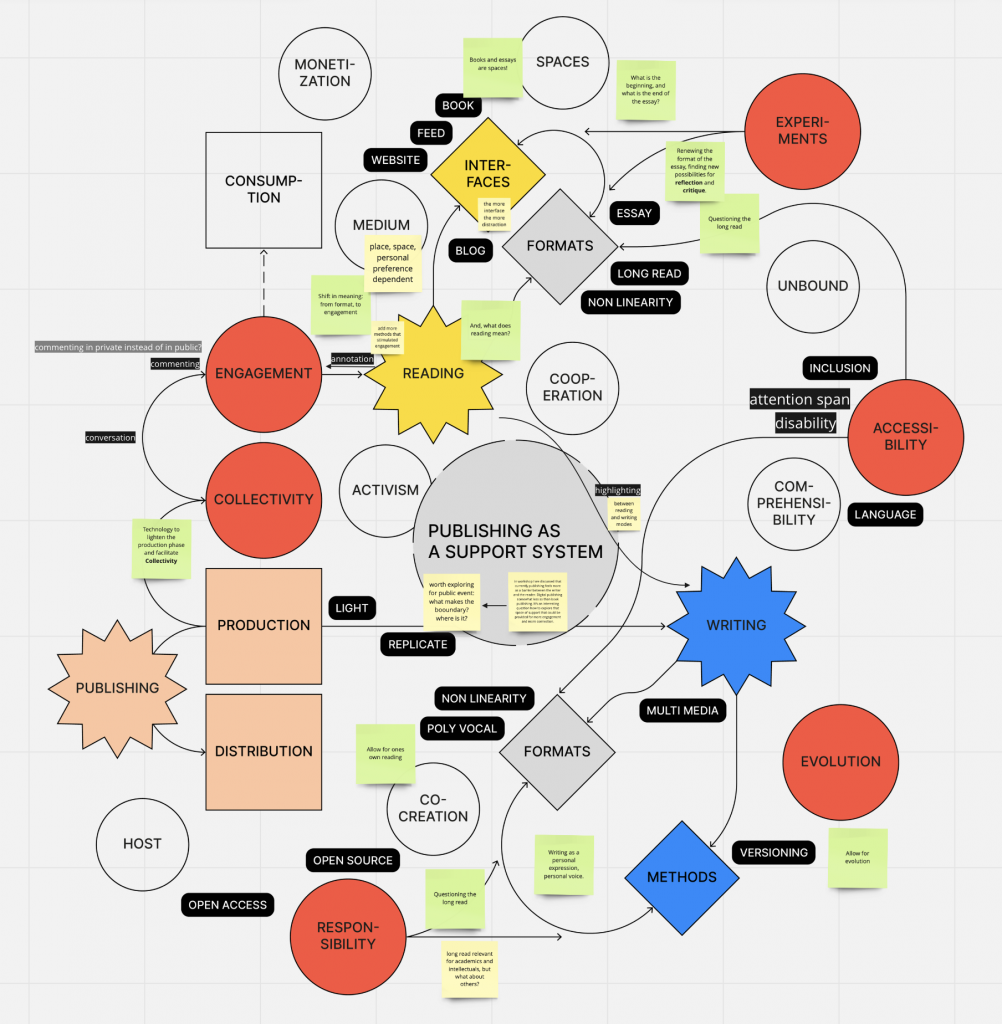
Beyond the Essay – a mindmap of the research process
Digital publishing is an inseparable part of our everyday lives. At the same time, it has become a weapon in the battle for attention, clicks, and political influence. Information overload and obscure mix-ups between commerce, content, and political manipulation give a headache to readers, content producers, and publishers. In times when most content is cheap and abundant, especially independent publishers, who focus on high-quality cultural content and do not rely on endless funds from advertising have a hard time surviving the competition with large media corporations, and tech giants–now dominating not only social media but also AI. The intensifying pressure on countering fake news, keeping up with developments in tech, and protecting the democratic character of media calls for new forms of resistance for cultural critical publishing that will be able to respond to both contemporary media culture and changing reading habits. The current situation of maneuvering between corporate and political powers puts independent publishers in a position that is counterproductive for the role and relevance they ought to play in the social and cultural realm. Creating independent critical content requires plenty of time and effort, and it is not meant to be consumed within seconds. While on the Web 2.0 content is cheap, fast, abundant, and addictive it is increasingly difficult to keep even the most dedicated readers interested as they grow more impatient, quickly distracted, and disengaged.
Is critical reflection online a mere fable from the past or does it still have a space and readership today? Could ways in which content is created and published allow the readers to gain more agency in the way they behave online? What technologies can assist them with that? Could we imagine that the same digital technologies, which are currently used for economic exploitation become a support system to stimulate reflection in the online sphere? What cultural and digital strategies could be used to create alternative ways of online publishing, that expand the room for reflection and possibly reconstitute a form of collectivity online?
In the search for answers to these questions, across the past two and a half years Andrea Prins and I have been developing a research project titled Beyond the Essay: New Ways of Critical Reflection and have led a corresponding workshop series New Ways of Reading: Between Experiment and Accessibility realized in collaboration with Framer Framed in the fall of 2022. Beyond the Essay is an ongoing project and an evolving process where we start to identify some of the building elements of new spaces for critical reflection online. In our research, we are looking for possibilities to encourage reflection, engagement, collectivity, and polyvocality that would offer writers, readers, and publishers the opportunity to make critical writing more relevant for contemporary audiences. A part of our research methodology developed into conducting hands-on workshop experiments where we attempt to re-imagine critical reading, writing, and publishing through slower, more reflective ways of creating and engaging with content.
Critical reflection is a powerful tool that allows one to formulate questions, confront bias, point out contradictions, and look for new directions. Especially in a time when navigating online media becomes so complex and confusing, it is of critical importance to find ways in which we could re-discover critical reflection and tool up for it. Let’s be honest, it is not a fight, we will be able to win without technological assistance, and how we create and use computational tools also needs to be considered.
In a series of work sessions with Varia we explored three methods developed with or by Varia members. The first one focused on exploring a collective annotation system by using a spellbook of __MAGICWORDS__; the second played around with the idea of inversing indexing formats into unexpected relational forms of reading, which they call x-dexing; and the third one unfolding an understanding of how algorithms such as word2vec could help us embrace complex relations within texts instead of simplifying and quantifying them (word2complex).
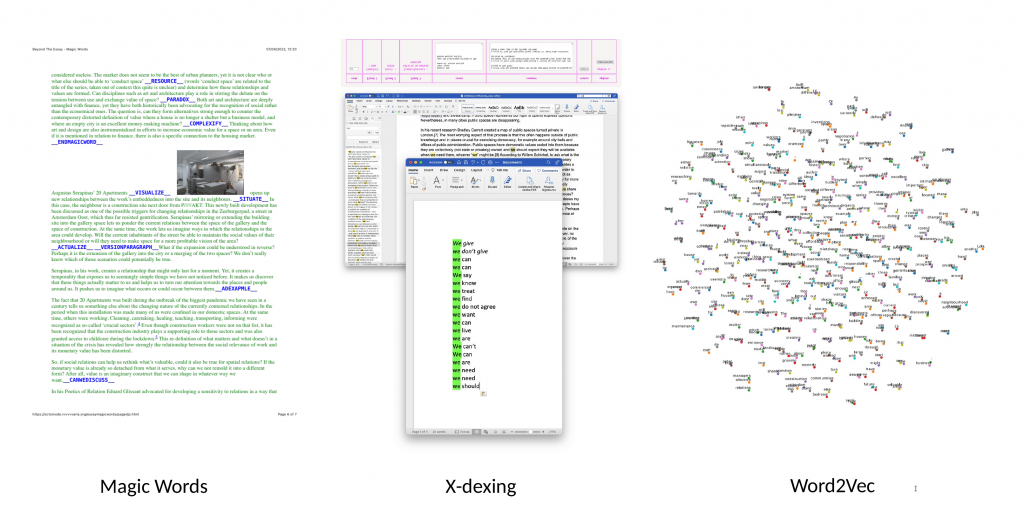
Experiments conducted at the workshop in Varia
These exercises, with what Varia provisionally calls more-than-computational practices, were collaborative and speculative acts of questioning and discovering unobvious forms of using existing digital tools for new ways of reading existing content. What emerged out of these highly engaging experiments was as Manetta Berends and Cristina Cochoir described it in their report from our collaboration––a formation of a social environment in and around the text. These relational approaches between readers, writers, computational tools, use protocols and their entanglements allowed us to explore a spatial and collective dimension of how readers, writers, and publishers can engage with each other through text.
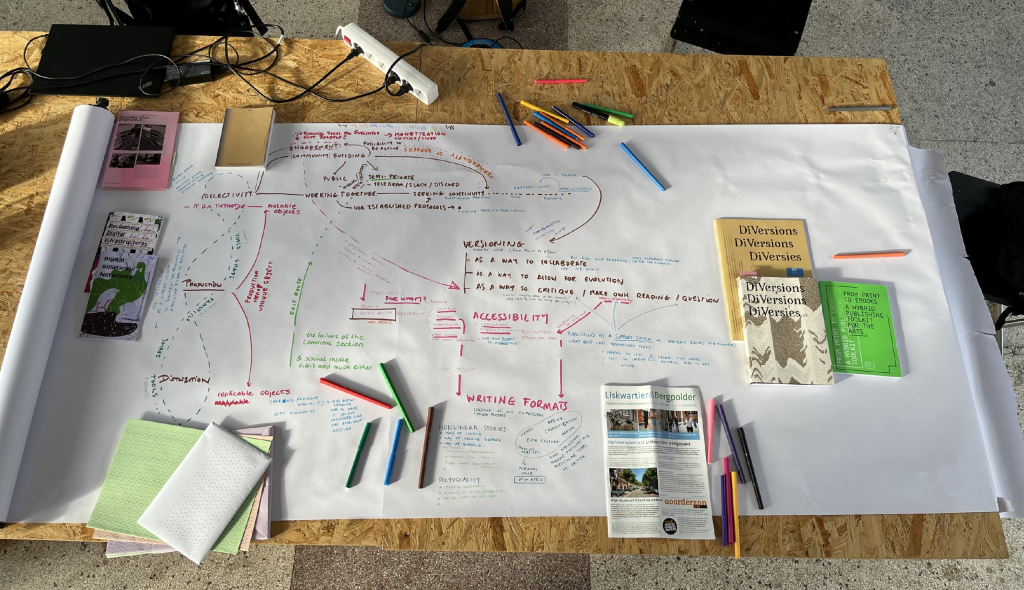
Mapping dimensions of critical reflection and related practices during the workshop at Varia
While looking for new ways of thinking about critical reflection and how it affects reading, writing, and publishing we realized that the tension between experimenting to discover new possibilities and keeping them accessible to audiences beyond the niche of digital culture was rather challenging.
Exploring that tension further and looking for more low-threshold ways to look for potential future ways of embracing critical reflection we dove deeper into more basic ways of approaching the technology and the audience. Through different forms of experiments with assisted close reading and deep reading using at times less ethically pure technologies we aimed to engage users, who are not engaged with the critique of digital culture in their day-to-day practice. Yet, who do have a vested interest in finding new ways to engage with text online.
We started our event series from the premise that the quest for finding new ways of imagining critical reflection online ought to start by reclaiming agency by readers themselves. In the first workshop organized as a part of the New Ways of Reading series titled Owning Readership, embracing text collectively through an array of deep and close reading exercises turned out to not only be joyful but also allowed to create a degree of focus and attention for reading, which the participants had not been able to experience in a long time. One of the key takeaways was the role of the interface in activating a reflective mindset by not asking too much of the user. The more complex the possibilities within the interface and the familiarity required to navigate it the more distracting and dysfunctional the reading environment has been perceived.
The second event Imagining Accessibility took up the act of writing to explore the relationship between the mutability of the text (both in terms of its polyvocality and evolution in time) and the results this could have for increasing accessibility for various users. Here different ways of engaging with text as well as peer readers or other writers were explored through three exercises: collective writing, building up non-linearity, and summarizing with AI. Seeing the text as a playground of versions offered critical perspectives not only stimulating the creativity of writing but also forming a contrast with static institutional forms of text.
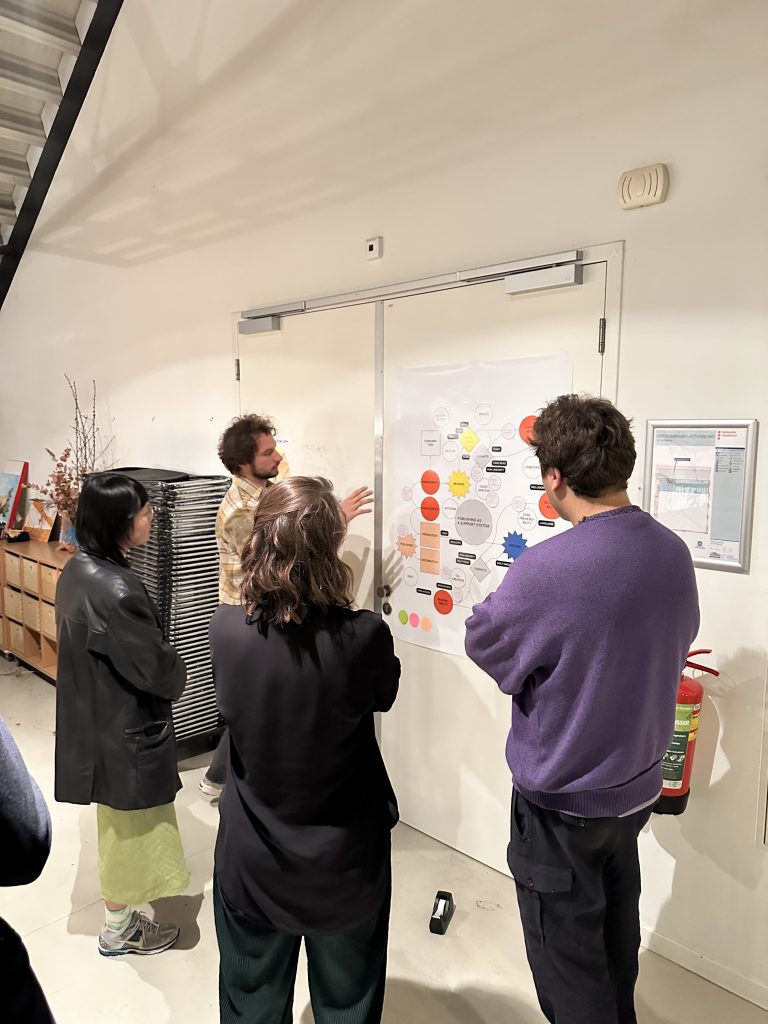
Workshop ‘New Ways of Reading: Imagining Accessibility’ at Framer Framed
In Publishing Experiments for all, which combined a presentation and a workshop we aimed to bring the experiences from the first two sessions together with the publisher’s perspective on the possibilities of introducing such new forms of reading and writing to the industry. The views about the future of digital publishing shared by the participants ranged from exploring the possibilities of radical change and breaking the current patterns, through imagining inter-media hybrids or cross-connections, to concerns regarding sustainability of experiments and ensuring broad spectrum of participation. New experimental forms of publishing envisioned in that session included inviting critical reflection through engaging with visual argument maps; introducing formats that would allow the readers to add their own ‘voice’ or to read through the eyes of another person; and the use of good old modular publishing. At the same time, a general conclusion emerging from this and other discussions we had throughout the project seems to be that the publishing sector is and will be rather unwilling to change.
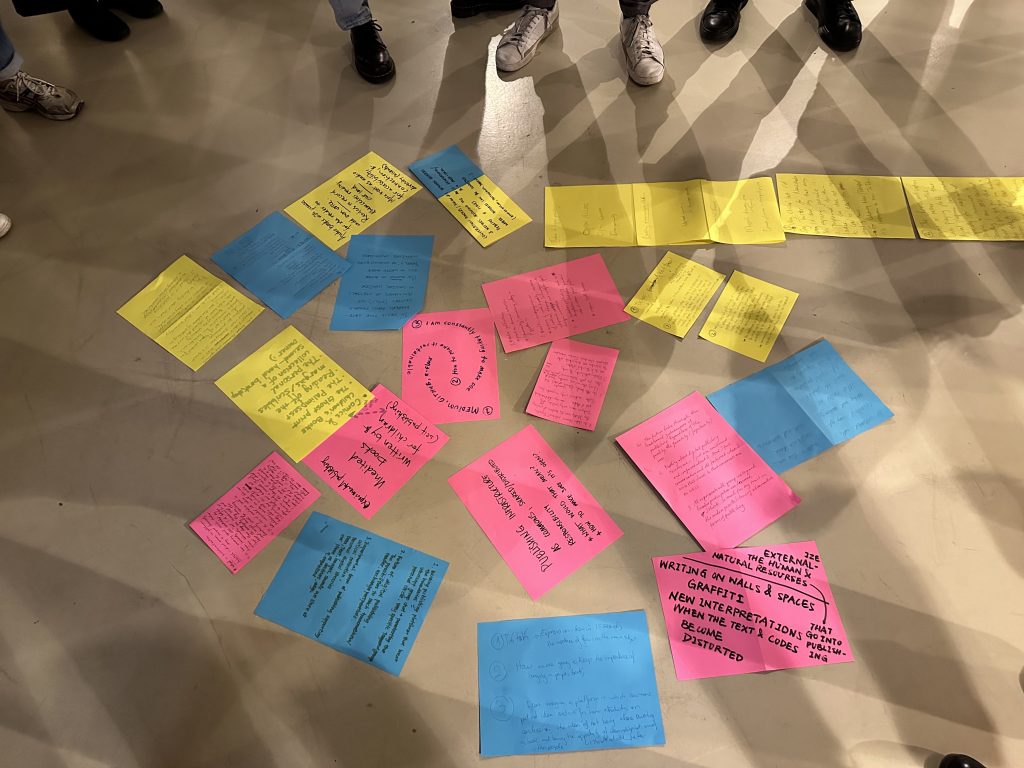
Workshop ‘New Ways of Reading: Imagining Accessibility’ at Framer Framed
There seems to be a certain paradox between the need of urgently building forms of resistance and the general slowness with which many online users embrace the tech. Introducing new tools or methods will always require curiosity and most likely will push audiences outside of their comfort zone. Yet the experimental side of tech in its geekiness tends to create a literacy barrier that scares away many older and younger folks relying on the frictionlessness of contemporary corporate UI’s. Is critique of the digital culture bound to always be inaccessible? Is that a productive course of action? Can we create critical interfaces that would also allow to build safe spaces for critical reflection and at the same time create more critical mass for resistance in online media?
Beyond the Essay was made possible by Stimuleringsfonds Creatieve Industrie.


